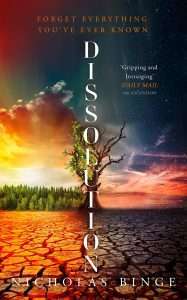Science-Fiction and Horror: Two Sides of the Same Coin
‘In Space, Nobody Can Hear You Scream’, the famous tagline for Ridley Scott’s 1979 film Alien, encapsulates so much of what ties science fiction and horror together in a single sentence: powerlessness. It’s a concept we return to again and again as humans. When I deliver workshops on horror writing and I get students to identify their top five scariest scenarios, almost all of them have something to do with a loss of control: over yourself, over your environment, over the world. It’s a bedrock of the genre.

Sure, it makes sense that classic sci-fi settings do horror so well. Where else are you as utterly powerless as in space, where you can’t rely on oxygen, on gravity, on all the things that you, as a human being, have evolved to need in order to survive? The same logic applies to other sci-fi concepts, too. Take time travel. Oh, it seems all exciting on the surface, zipping around in a TARDIS seeing any period of history we want, but in reality, the concept is terrifying. As individuals and societies, we are so reliant on a consistent linear understanding of time. Everything we do is built around it — our relationships, our beliefs, our sense of self. Once you start pulling at the seams of the things we implicitly rely on, the things we trust, that’s when you find yourself back in terrorland. In my novel Ascension, playing with time was an easy way to ramp up the horror for the main characters. After all, if you can’t rely on the seconds passing the way you expect them to, how can you rely on anything?
But for me, the similarities between science fiction and horror run deeper than just powerlessness and loss of control. What ties both of them together is the way they deal with humans confronting things we do not understand. In sci-fi, that can sometimes come across with a sense of awe, as it does with Arthur C. Clarke’s classic Rendezvous with Rama, or it can be associated with a sense of impossible dread: this is the Lovecraftian realm of cosmic horror, where things are so beyond our comprehension we would go mad even to consider them. Inherent in both, and I think core to the entire science-fiction genre, is the idea that there are things out there that we do not comprehend, and possibly cannot comprehend. The meeting point between us, stupid monkeys that we are, and this incomprehensible vastness is where the magic happens.

Author Nicholas Binge, Photo by Allys Stafford
Horror, in many ways, is doing the same thing, but rather than trying to tackle the vast unknown out there, it’s dealing with the vast unknown in here (imagine me pointing at my chest emphatically). The great 13-century poet and Sufi mystic Rumi once wrote “Heart is a sea, language is the shore.” I’ve always loved this image: that deep within us there is a vast ocean of feeling and emotion that we can only access the edges of with the words we have to hand. The more language, the longer the shore, and the more of the sea we can understand. And sure, some of the more distant sea will wash up on the shore now and again, the currents and shifts bringing it to the surface. But there will always be the deep ocean — a Mariana Trench — so distant from our ability to describe it that we’ll never really be able to know what lives there. Reaching that trench is what horror is all about: we tell these stories to lengthen the shore, to send out boats, to discover the unnameable and incomprehensible depths inside ourselves.
When I write, I see the two genres as two sides of the same coin, external and internal, both at their heart trying to unravel the complexity of what it means to be human by pitching us up against things outside of our capacity for language and thought. My new novel, Dissolution, is very much my take on this duality. In it, the strange science-fictional concepts my characters are forced to tackle are vehicles to delve inwards, to dive off the shore and into the sea and see what lives at the bottom of the Mariana Trench inside us all.
Read Dissolution by Nicholas Binge
The post Science-Fiction and Horror: Two Sides of the Same Coin appeared first on Grimdark Magazine.



